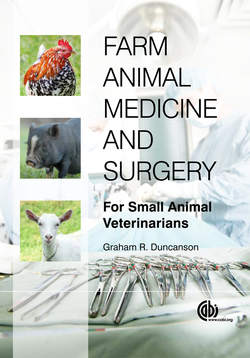Читать книгу Farm Animal Medicine and Surgery - Graham R Duncanson - Страница 116
На сайте Литреса книга снята с продажи.
Parasitic gastroenteritis (PGE)
ОглавлениеThe main parasitic nematodes causing PGE that are found in the UK are Ostertagia ostertagia, Cooperia onocophora, Nematodirus helvetianus, Trichostrongylus axei and Haemonchus placei, there are many other such species found throughout the world. These nematodes do not have an intermediate host and each tends to have different clinical manifestations.
O. ostertagia manifests as two separate clinical conditions, type 1 and type 2:
• Type 1 is the more standard form of PGE, with susceptible animals ingesting larvae later on in the grazing season. These become adults in the abomasum in the late summer, causing diarrhoea and ill thrift. High faecal egg counts (FECs) will be recorded. Anthelmintic treatment, unless there are resistant strains, will normally alleviate the problem.
• Type 2 follows type 1 in that larvae are ingested, but these do not become adults; rather they encyst in the mucosa of the abomasum in large numbers. The encysted larvae lie dormant until a trigger factor in the winter makes them all emerge together, when the animal will not only have severe diarrhoea but will be very ill and may even die. FECs will not be raised but diagnosis can be confirmed by a blood sample to measure serum pepsinogen. Treatment not only consists of anthelmintics but also of dexamethazone and antibiotics to try to reduce inflammation in the abomasal mucosa.
C. onocophora causes a standard form of PGE like O. ostertagia type 1, but normally slightly earlier i.e. halfway through July in the UK. N. helvetianus is the most common species in cattle worldwide. The eggs, which are very resistant to degradation, will accumulate on pastures for many months and infect calves in the next season. Severe signs of diarrhoea may occur before large numbers of easily recognized eggs (they are twice the size of those of other nematode species) occur in the faeces. T. axei is the very common small stomach worm which causes standard parasitic gastroenteritis worldwide. H. placei does not occur in the UK, but causes severe disease in tropical and subtropical countries. The disease and the diarrhoea may be so acute that the FEC will not have had time to rise to the massive levels seen later in the disease. Prompt treatment with anthelmintics is vital to prevent death.
